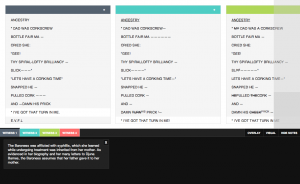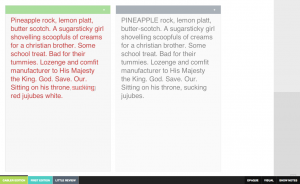Community
November 11, 2012
Interface Design and the Modernist Versions Project
My name is Daniel Carter, and I’m a PhD student in Information Studies at the University of Texas at Austin. I’m currently working with Dr. Tanya Clement on the Modernist Versions Project and wanted to write briefly about what we’ve been thinking about in relation to digital editions and collation.
My role in the Modernist Versions Project is currently to think about the design of tools used for collation and of the interfaces that are used to display versioned texts. My background is in Modernist literature (MA from The Ohio State University) and web development and design—so this is work that’s more than a little in line with my interests.
At the moment, I’m working on reviewing existing tools for collating texts and for presenting TEI-encoded versions. I’m also working on prototypes for interfaces that would allow users to more easily view and annotate multiple versions of texts. Screenshots of (very early) progress are included below.
Related to this work is an attempt to think about how design methods function (and don’t) in a humanities project. In this, I follow Stan Ruecker and Alan Galey in arguing that design “operate[s] in the messy middle ground between interpretation and making, and … can contribute to a theoretical framework for new questions facing humanists” [1]. On one hand, I think this line of thought encourages us to consider the ways the interfaces that we currently work with are structuring our relations to and conceptions of things like texts, editions, collections, etc. On the other hand, it gives us license to imagine new ways of working with text.
This “messy middle ground” is a place where the multiple theoretical positions that the humanities promotes can mix it up with the considerations of real users and technologies that an information school focuses on. It’s a fun area to be working in, and I’m looking forward to sharing more of our work as prototypes and sketches work their way toward, well, probably more prototypes and sketches. I’m grateful for EMiC’s support, and I look forward to meeting many of you this summer in Victoria.
—–
The version of “Ancestry” shown above is borrowed from Tanya Clement’s In Transition: Selected Poems by the Baroness Elsa von Freytag-Loringhoven.
1. Galey, Alan, and Stan Ruecker. “How a Prototype Argues.” Literary and Linguistic Computing 25.4 (2010): 405–424.

